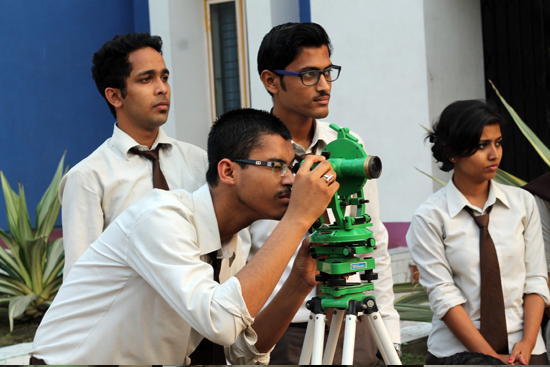Overview
B.Tech in Civil Engineering
Civil engineering is the broadest of the engineering fields. Civil engineering focuses on the infrastructure of the world which include Waterworks, Sewers, Dams, Power Plants, Transmission Towers/Lines, Railroads, Highways, Bridges, Tunnels, Irrigation Canals, River Navigation, Shipping Canals, Traffic Control, Mass Transit, Airport Runways, Terminals, Industrial Plant Buildings, Skyscrapers, etc. Among the important subdivisions of the field are construction engineering, irrigation engineering, transportation engineering, soils and foundation engineering, geodetic engineering, hydraulic engineering, and coastal and ocean engineering.
Civil engineers build the world's infrastructure. In doing so, they quietly shape the history of nations around the world. Most people cannot imagine life without the many contributions of civil engineers to the public's health, safety and standard of living. Only by exploring civil engineering's influence in shaping the world we know today; can we creatively envision the progress of our tomorrows.
Civil engineers build the world's infrastructure. In doing so, they quietly shape the history of nations around the world. Most people cannot imagine life without the many contributions of civil engineers to the public's health, safety and standard of living. Only by exploring civil engineering's influence in shaping the world we know today; can we creatively envision the progress of our tomorrows.
Course Duration
4 Years
4 Years
Approved By
AICTE & MAKAUT
AICTE & MAKAUT
Eligibility
- 10+2 with Physics & Mathematics along with any one of Chemistry / Biotechnology / Biology / Computer Science / Computer Application / Technical Vocational Subject and English as compulsory subjects with individual pass marks ( in both theory and practical wherever applicable) in all the three subject as stated above.
- Must have obtained at least 45% marks ( 40% in case of candidates belonging to reserved category e.g. ST, SC, OBC-A, OBC-B, PwD) in the above three subjects taken together.
- The eligibility for lateral entry is 10th + 3yr Diploma in relevant field or B.Sc. Degree from any university recognized by UGC with at least 45% (40% for SC/ST/OBC-A/OBC-B/PwD) marks.


